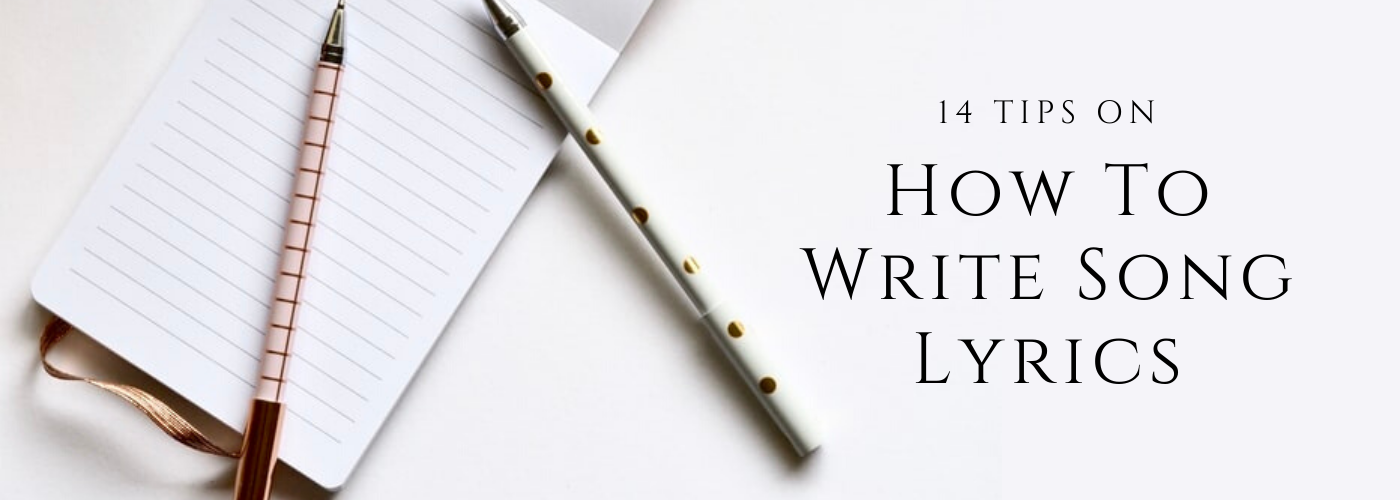
Learning how to write song lyrics for the first time can be a daunting task. If you’ve never written any kind of music before, it can be even scarier, but it doesn’t have to be.
Can someone please teach me how to write lyrics??
— George Kelly (@george_kelly18) February 23, 2020
I strongly believe that anyone can become a lyricist, even without an understanding of music theory. This guide was written to help beginner songwriters in mastering the craft of writing lyrics. However, if you’re an intermediate to advanced lyricist, there may be some helpful tips in here for you as well.
If you’re interested in some tips on writing both lyrics and music, be sure to check out our other guides on the topic, 13 Steps To Writing a Song and 13 Easy Tips for Learning How To Write Songs.
In this guide we’ll discuss the following tips for learning how to write song lyrics:
- Study Other Songs
- Get Inspired
- Write About Something You Know
- Start With A Title
- Identify The Hook
- Explain What You’re Trying To Say First
- Decide On A Structure
- Don’t Write In Order
- Choose A Rhyming Scheme
- Know When and When Not To Rhyme
- Find Lyrics In The Notes (and Vice-Versa)
- Collaboration Is Key
- Ask For Feedback
- Write Consistently
1. Study Other Songs

One of the best ways to learn how to write song lyrics is simply by listening to other great songwriters.
While passively listening to a well-written song, you tend to not think about the actual songwriting. However, once you actually pay attention to the composer’s technique, it can be an eye-opening experience.
Every artist writes in their own style. So, if you attentively listen to the lyrics in your favourite songs you’ll be amazed by what you learn.
Try not to copy anyone’s technique exactly, rather discover what you like best about each artist’s style. Then, combine these in a way that makes sense for the stories you want to tell.
2. Get Inspired

This is often the biggest hurdle when learning how to write song lyrics and even experienced lyricists regularly struggle with it. Finding something to write about seems easy in theory, but in practice, it can be a difficult and frustrating thing.
It’s hard to force inspiration by sitting down and staring at a blank page. So, it’s usually best to do something else that may trigger inspiration to come to you. Going for a walk, spending time with friends, watching a movie and listening to new music are all great tactics.
Keep your mind open to inspiration during this time and eventually, it will come to you. Once you’re feeling inspired, do everything you can to work quickly and write as many ideas as you can. Many songwriters describe inspiration to be fleeting. So, the more you write during this time the better.
Check out our guide on overcoming songwriters block for more thoughts on this topic.
3. Write About Something You Know

Going off of the last tip, it’s easiest to write song lyrics when you’re inspired by something you can relate to.
While it doesn’t necessarily have to be something you’ve experienced, it can be helpful when you understand the subject matter. Otherwise, it could come across as inauthentic and will be much more difficult for you to formulate your thoughts into lyrics.
If you’re writing about something that’s happened to you directly, chances are the song will be even better. This type of vulnerability can be nerve-wracking. However, the more you do it, the easier it gets and the more your lyrics improve.
4. Start With A Title
One of the best ways to start a song is simply by coming up with a title and going from there. Oftentimes, the title is a phrase or word that encapsulates what the song is all about.
By coming up with a title first, you can use it to inform your lyrics in the rest of the writing process.
There’s really not as much time as you would think to get the message of the song across. So, making sure that each lyric you write serves is serving the song’s purpose will really help you make the most of each word.
Of course, this is just one way to get started. There’s no rule that says you have to start with a title. Plenty of times you’ll work on a song for hours and have no idea what to call it and that’s okay too.
5. Identify The Hook

The hook can be melodic, lyrical or oftentimes, both. It’s the most memorable part of a song, the thing that a listener will recite to friends when describing it.
A good hook can make or break a song’s success. So, it’s one of the most important parts of any composition.
Because of this, make sure you put a considerable amount of thought into what the hook for your song will be. Even if the hook is strictly melodic, you’ll still want to be aware of it. This is because every aspect of the song should build towards the hook’s payoff.
Read a little more about what makes a good hook in our article on The Hit Songwriting Formula.
6. Explain What You’re Trying To Say First

Songwriting is essentially just storytelling. So, if you’re unsure what story your song is trying to tell, it will be difficult to write lyrics for it.
A great practice when you’re stuck lyrically is to write out a synopsis of everything you’re trying to say. As you do, divide it into the sections that make up your song, that is to say, the verses, the chorus and the bridge.
Once you’ve finished, go through each section and explain what you’re trying to say in a lyric format. It will be much easier now that you’ve properly organized your thoughts.
7. Decide On A Structure
Speaking of dividing your song into sections, before you can do this, you first have to decide on a proper structure for your song. One of the most popular song structures are as follows:
- Intro
- Verse
- Chorus
- Verse
- Chorus
- Bridge
- Chorus
- Outro
However, there are many many more formats out there to utilize, as well as additional sections such as pre-choruses and post choruses. The video below goes into further detail of some popular songwriting structures you can use:
Once you’ve decided on a structure, don’t feel inclined to stick with it. Simply let it serve as a guide as you attempt to complete things.
Once you’ve started, you may find that the song is much better suited to another structure altogether.
8. Don’t Write In Order
Don’t feel the need to write the lyrics in the order that they appear in the song. Instead, go where the inspiration is hitting you. If you have some great ideas for the second verse or the chorus, start there and work your way backwards.

A good practice is to keep moving and write as many sections, as quickly as you can, in whatever order they come to you. Don’t worry too much about the quality at this point. Your main focus should just be to write a rough draft.
Once you’ve got the bulk of the song lyrics written, then you can go back and finesse everything. It’s much better to have a well thought out rough draft that you can easily clean up than to work hard on one section and not know what lyrics to write for the rest of the song.
9. Choose A Rhyming Scheme
Although a rhyming scheme is not necessary to write lyrics, the best songs follow some kind of a rhyming pattern. They’re especially helpful when starting out, as they require you to put more thought into structurally conveying a song’s story.
Like song structures, there are plenty of rhyming schemes to choose from and it would take an entire article to delve into them. Instead, check out the video below which goes further in-depth on the topic of rhyme schemes.
10. Know When and When Not To Rhyme
This point may seem a little contradictory after the last tip. I always urge songwriters to stick with a rhyming scheme when they start out, but as noted earlier, this isn’t the only way to write song lyrics.
I find that the best songs have a sense of symmetry to them. So, trying to rigidly stick with a rhyming scheme when you’re learning will force you to be conscious of and practice these techniques early on.
It’s worth noting that there are plenty of great songs out there that leave lines hanging and don’t resolve rhymes. However, these songs do so in a way that doesn’t seem jarring or out of place.
So, as you’re enhancing your rhyming abilities, be open to the idea of not having verses strictly follow a rhyming pattern. What you don’t want to do is break away from rhymes out of laziness, always think of what best serves the song.
As with most art forms, learning how to create within the rules makes it much easier to break them down the road.
11. Find Lyrics In The Notes (and Vice-Versa)

If you already have a melody or an idea for a melody as you’re trying to write the song’s lyrics, use this to your advantage.
Think about the notes in the melody, the pacing of their rhythm and use that to inform your lyric choices.
Oftentimes you will find the music mimics a certain speech pattern. Being conscious of this can lead you to discover words you never would have thought of otherwise.
12. Collaboration Is Key

You can learn a lot about the craft of lyricism by working with another songwriter. Whether they’re experienced or just as new to it as you are, collaboration can be an awesome experience.
There tend to be two main parties of thought when it comes to co-writing. First, those who really enjoy it and welcome the opportunity to work on a project with someone else. Then there are those who are so invested in their craft that they worry someone else’s perspective may ruin theirs.
Although there is nothing wrong with the latter type of songwriter, I urge everyone to try co-writing, if only for the learning experience. If you’re worried about bringing a song you’re passionate about to the table with another artist, then don’t. Instead, start a brand new song and focus on writing lyrics that you aren’t as emotionally attached to.
The great thing about co-writing is that each of you will have your own way of solving problems in the process. Because of this, it will be difficult to run out of ideas and you’ll discover new concepts you can apply to your own work even when you’re writing by yourself.
13. Ask For Feedback
This is often an even scarier step than co-writing. However, it’s necessary if you want to learn how to write songs that are more than “just okay”.
When you’re happy with a piece, don’t treat it like a finished work. It’s important not to be 100% attached to your lyrics, as there’s always room for improvement.
Instead, take it to somebody you trust and ask for their opinion on it. This can be an eye-opening experience because they’ll notice flaws in it that you may not have realized. Most importantly, they’ll be able to tell you if something doesn’t make sense, as someone who’s unfamiliar with the story behind things.
It’s certainly not easy to do this. It can be hard to be vulnerable and open yourself up for criticism. However, once you do you’ll have a huge edge on plenty of other lyricists out there because you’re actively trying to improve.
14. Write Consistently

Learning how to write great song lyrics isn’t something that happens overnight. As with any craft, it takes time, practice and a lot of trial and error to get good at it.
Don’t be concerned if your first few or even your first hundred songs aren’t perfect. Nobody’s first compositions are ever are and oftentimes, writers are way more critical of the music they’ve written than is necessary.
The important thing is that you aren’t discouraged and keep working at it. Find as many opportunities as you can to compose song lyrics and treat each piece like a learning experience.
Over time, you’ll begin to improve and the process will become much easier. However, it’s just as important to remember that there’s always room for growth. Otherwise, your work will get stagnant, you’ll become bored with the craft and you’ll fail to reach your full potential.
Conclusion: How To Write Song Lyrics
Having a firm grasp on how to write well-crafted song lyrics can really help your career as a composer and an artist. Like any other art form, there’s a lot to learn but anyone can do it if they set their mind to it.
The first step is simply to study other song lyrics, then find inspiration in something you can relate to. This may lead you to identify the title or hook of the song (sometimes they’re the same thing), which can inform the rest of your writing decisions.
Identify a song structure and rhyming scheme early on, but don’t feel like you need to stick with them or work through the song from top to bottom.
Instead, work on each section as the inspiration hits you and if you’re stuck, try articulating what you want to say before putting it into lyric form. If a melody exists for the song, you may be able to find lyric ideas in this as well.
Finding someone to co-write songs with can help you learn a ton about the artform and once a song is finished, don’t be afraid to bring it to a friend and ask for feedback.
Finally, the most important thing is that you don’t get discouraged in the early stages and practice writing song lyrics as often as possible. The more you do it, the easier it will become and one day you’ll wonder what was so hard about writing lyrics in the first place.
If you enjoyed this article be sure to share it with your friends! Don’t forget to sign up for our email list and check out the rest of the Sundown Sessions Blog for more tips and tricks on songwriting, music business and home recording.
So, You’ve Written a Great Song! Now What?
Learning how to write great song lyrics and memorable music is only half of the battle. Once a piece is written, you still have to record it and get it out into the world for other people to hear.
Unfortunately, going into a professional, commercial studio to record a song can be an expensive and involved endeavour. This is where Sundown Sessions Studio comes in!
Our online recording studio offers world-class, award winning session musicians and engineers to work on your song remotely, at an affordable rate!
We produce high-quality recordings of indie music that can stand up against everything else that’s out there, getting played on the radio every day.
Head over to our pricing and packages page for more information on the services we offer.
Once you have your song recorded, our sister site Sync Songwriter can help you to start making an income off of your music. There, we teach indie artists from around the world how to get music placed into film and TV shows.
To learn more about the services offered at Sync Songwriter, check out this free video of The Top 5 Mistakes Most Songwriter’s Make Licensing Music (And How To Avoid Them).
